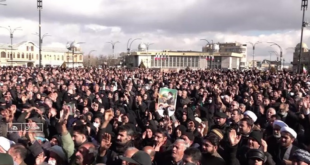Russian President Vladimir Putin says Moscow plans to target the United States with new hypersonic weapons if Washington deploys intermediate-range missiles in Europe.
“Russia will be forced to create and deploy weapons that can both be used on the territories from which the direct threat to us originates, as well as the territories where the centers of decision-making are located,” Putin said during his 15th State of the Nation address before the federal assembly in Moscow on Wednesday.
Putin’s frequent references to the moribund 1987 Intermediate-Range Nuclear Forces treaty came amid record-low approval ratings for the fourth-term Russian leader.
Putin rejected U.S. assertions that Washington’s decision to withdraw from the landmark arms control pact was triggered by Russian violations of the agreement. He charged that the U.S. made false accusations against Russia to justify its decision to opt out of the deal.
“The U.S. directly and crudely violated the rules of the [INF] agreement; they have had launchers in Romania for a long time,” he said, repeating a well-worn Kremlin talking point that refers to a Romania-based U.S. anti-ballistic missile system capable of firing Tomahawk medium-range cruise missiles.
The United States has long said that system is designed to defend against “rogue” states such as Iran and provides no protection against Russia’s nuclear arsenal.
“Russia doesn’t intend to deploy new missiles in Europe first,” Putin added. “If the U.S. really is going to deploy missiles on the European continent, it will exacerbate the international situation and create a genuine danger for Russia, as there will be missiles with a 10-12 minute flight time to Moscow.”
He then seemed to taunt the U.S., calling on leaders to calculate the range and speed of Russia’s most advanced weapons.
“It’s their right to think how they want,” he said about U.S. leaders. “But can they count? I’m sure they can. Let them count the speed and the range of the weapons systems we are developing.
“The tests of Poseidon, an unmanned submarine with unlimited range, are going well… This hasn’t previously been said, but today I can say that by the spring of this year, the first atomic submarine will have been launched into the water.
“We are ready for disarmament talks, but we are no longer going to knock on a closed door,” he later said.
Russia began voicing skepticism about the value of a sustained bilateral arms treaty more than 10 years ago, when Kremlin officials asked the administration of then-President George W. Bush to consider expanding the treaty to bring rising nuclear powers such as China into compliance.
The majority of China’s nuclear arsenal is classified as intermediate range, meaning Chinese compliance with the INF would be tantamount to a wholesale forfeiture of its arsenal.
In December, when Secretary of State Mike Pompeo announced U.S. plans to withdraw from the INF, he gave Russia 60 days to come back into compliance with the terms of the nuclear weapons pact, leaving the door open to reverse the withdrawal process.
“Russia has not taken the necessary steps to return to compliance over the last 60 days,” Pompeo said in a prepared statement on February 1. “It remains in material breach of its obligations not to produce, possess, or flight-test a ground-launched, intermediate-range cruise missile system with a range between 500 and 5,500 kilometers.
“The United States has gone to tremendous lengths to preserve the INF Treaty, engaging with Russian officials more than 30 times in nearly six years to discuss Russia’s violation, including at the highest levels of government,” he added.
According to terms of the original INF agreement, Moscow and Washington are obligated to six months of negotiations over differences, which, if unresolved, constitute full withdrawal from the treaty.
If the U.S. puts additional weapons in European host countries, Putin warned that Russia would not only target those nations, but field new weapons that will target “U.S. decision-making centers.”
 Eurasia Press & News
Eurasia Press & News



